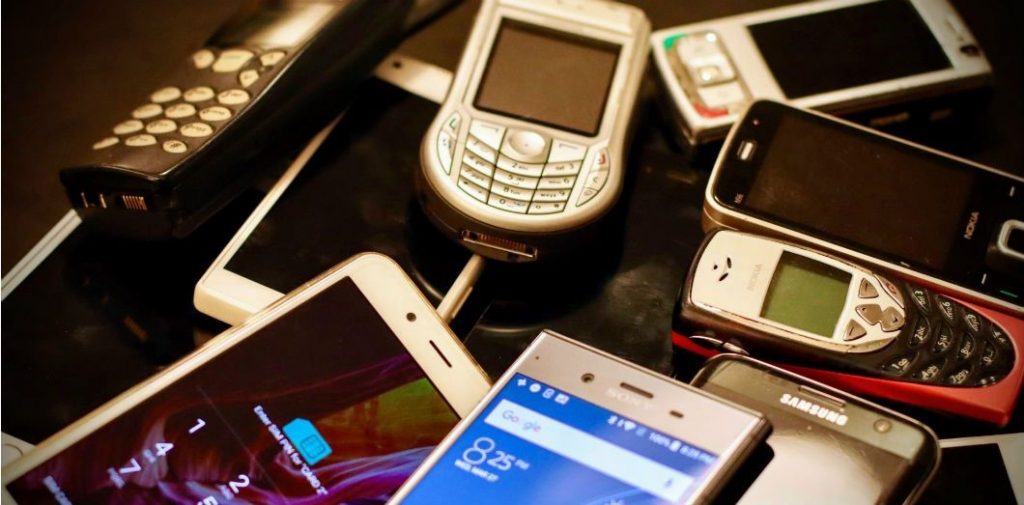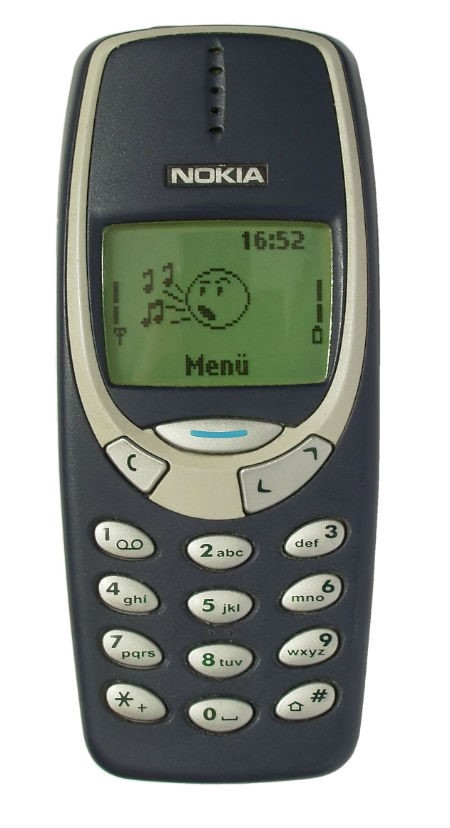Radiation, recovery of personal data and risks of vision and sleep disturbances push some people to return to less sophisticated phone models.

Applications, time-consuming and multiple, end up saturating some people who use smartphones. | Eirik Solheim via Unsplash
With her giant tote in recycled canvas and her colorful sneakers, Clara, a 19-year second-year medical student, has everything of a young girl of her time. However, at the end of his arm, no state-of-the-art phone protected by a silicone shell, like the majority of people of his age, but a small thick black rectangle. The object in question: a Nokia 3310, emblematic phone of the 2000s developed by the eponymous telecommunications multinational.

The Nokia 3310. | smial via Wikimedia
A fact that may surprise, when we know that in France, 98% of 18-24 year olds are currently equipped with a smartphone, according to the Research Center for the Study and Observation of Living Conditions (Credoc). More generally, in 2017, almost 75% of the population had a smartphone according to the Telecom Regulatory Authority (Arcep).
“Until last year, I had an iPhone 7,” explains Clara. What changed the way I looked at it was to realize, at the time of the start of the first year of medicine, that it would be impossible for me to reach the required level of concentration while having my smartphone within reach hand, she continues. Even if I didn’t feel like I was on my phone, I quickly noticed that I regularly raised my class head to see if I had notifications, which induced jerks in my pace. job.”
After a few weeks, the young girl decides to exhume her older sister’s old phone, relegated to the rank of family antiquity, and to take leave of her iPhone. “It may seem odd, but it’s as if separating myself from my smartphone had relieved me of a weight, ” she confides before concluding: It is for this reason that I decided not to resume my iPhone, even after validating my first year.”
“Permanent solicitation”
This impression described by Clara of being able to be contacted at any time corresponds to what the researcher Dominique Boullier calls “permanent solicitation”. “With the arrival of SMS in the mid-1990s, there was already a form of uninterrupted connection that was imposed on users, notes this professor in digital sociology at Sciences Po. However, with the arrival of the smartphone, we have reached a higher stage: from now on, those who hold a smartphone are exposed to the possibility of being constantly called upon and disturbed. “
According to the 2018 Push Barometer for Mobile Applications calculated by smartphone specialist Accengage and based on more than 50 billion notifications sent around the world between January and June 2018, nearly 68.4% of French people would accept receiving notifications when installing an app.
“The multitude of applications took precedence over the fundamentals and created a form of pressure.”
Dominique Boullier, sociologist
According to the study, this would even make France the second European country with the highest opt-in rate, that is to say, acceptance of push notifications.
“Today, with the smartphone, the idea of a tool telephone has completely disappeared, analyzes Dominique Boullier. It is for this reason that in recent years, we have seen users give up the smartphone. The multitude of applications finally took precedence over the fundamental elements and led to a form of pressure, which one can imagine that it is only possible to detach yourself by switching back to an older generation mobile model.”
Hello evils
The feeling of constant solicitation is not the only reason that can induce individuals to give up the smartphone. Jeremy, 30, working in an accounting firm, explains that he separated from his Samsung smartphone almost two years ago due to headaches. “On average, I spent two to three hours a day on my smartphone,” he recalls, adding that he was particularly fond of Instagram. Apart from the fact that this use wasted time, I also had the impression that I often had head and eye pain at the end of the day, ” he continues.
After a trip to the ophthalmologist, who suggests a form of visual fatigue requiring limiting screen time, Jeremy orders a Motorola Gleam on the internet and gives his Samsung to one of his relatives. For him, no doubt: he has the impression of being more rested and less prone to migraines since.
Six Apple and Samsung smartphones would exceed the permissible electromagnetic wave emission thresholds.
For Sylvie Chokron, neuropsychologist and author of a report on the impact of screens on cognitive processes for the Observatory of Visual and Hearing Health. it is very likely that smartphones will test visual abilities as well as the ability to focus on a task. “Smartphone screens stimulate a very small part of the visual field because they represent a very limited area, ” she explains. Consequently, with smartphones, our attention is less and less demanded as a whole, which decreases the dynamism of our mental life and can even affect the cognitive development of the youngest, she concludes.
Another health concern related to smartphones is the issue of radiation. This is evidenced by the class action filed in October by the American law firm Fregan Scott in reaction to a study conducted by the Chicago Tribune, revealing that six Apple and Samsung smartphones would exceed the authorized emission levels of electromagnetic waves.
Personal data and ecology
Also often at the center of the approach of people giving up the smartphone, the controversies multiplying around the risk of transmission of personal data. According to a survey published on December 23 in the New York Times, a dozen companies, in total, would record the entirety of the movements carried out by the individuals holding smartphones thanks to the applications installed on it. According to the American daily, these companies would then sell this information to other companies. An activity being, as the New York Times recalls, completely legal given the weakness of the legal framework in terms of data protection and smartphones.
“It was already legitimate to ask the question of the recovery of personal data from the time of non-smartphone phones, since it was also possible to extract information from it, comments Dominique Boullier. However, it must be recognized that the risk was lower because there were far fewer applications and information on older mobiles. Today, if you really don’t want to run the risk of being tapped or whatever, the only sure solution is to buy several chips and change them every day.”
Thus, for the digital sociologist, the question of personal data, although crucial, predates smartphones. “In my opinion, the threat that must be linked to the arrival of smartphones is ecological,” he points out, stressing the large proportion of energy consumed by smartphones. “In the coming years, the big challenge will be to create modern phones made of materials whose extraction is respectful of the environment, hyper-secure, encrypted from start to finish, and consuming less energy. Without these innovations, we can expect a decline in smartphone consumption.”
If we look at the figures for the past few years, it even seems that this decline has already started. Proof of this is, according to the firm Strategy Analytics, the smartphone industry experienced for the first time since its creation an annual decline in 2018. China, which concentrates a third of smartphone sales in the world, would have seen sales fall by 11% in 2018. More recently, according to the International Data Corporation Institute, the first quarter of 2019 would have been marked by a drop in smartphone deliveries of 6.6% worldwide.